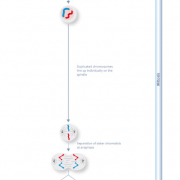Definition
A process of cell division that results in two daughter cells, each with the full complement of DNA.
Use in clinical context
For our bodies to grow, develop and repair, cells must divide in a process called mitosis that produces two identical daughter cells. In order for the new cells to contain the correct amount of DNA the whole genome is duplicated before cell division. Errors can arise during genome duplication and, if uncorrected, will be passed on in subsequent rounds of cell division. Not all errors are problematic, but some can lead to conditions such as cancer.
Related terms
Cell | Cell division | Daughter cells | Deoxyribonucleic acid (DNA) | Genome




